
Justice After
Katrina
• Reject Failed U.S. State:
Consolidate People’s Independent Organizing
• March and Conference: From Outrage to Action - The People’s Hurricane Relief Fund
• Thanksgiving Relief Effort a
Success! December Holiday Roadtrip for Relief
• New Waveland Cafe Katrina Relief Kitchen Moving - Welcome Home
• 9th Ward/Downtown Project Update
- CommonGround
• Government Again Forcing 54,000
Families Out: Struggles to Stop Evictions Go Forward
• Fact Sheet Produced, Amnesty Demanded: Nightmare for
Family Members and Prisoners -
People’s Hurricane Relief Fund
• Incarceration of Youth
Consolidate People’s Independent Organizing
The U.S. Marxist-Leninist Organization salutes all the many organizations, collectives and Katrina survivors standing together for the rights of all. We salute the bold resistance and independent organizing that has emerged in New Orleans and the Gulf region and the leadership expressed in the call, Justice After Katrina: The People Must Decide.
The struggle being waged to defend the right to return and rebuild, the right to housing and livelihoods, the very right to be, stands in direct opposition to the chaos and anarchy unleashed by the U.S. state. It is a vital -development to be strengthened and consolidated.
Raising the necessity for the people to decide brings front and center the problem posed by the present political set-up, where the people are blocked from decision-making. The government organized disaster after Katrina made this brutally clear. The peoples’ readiness to assist was blocked, their drive to defend rights rejected while the government issued shoot to kill orders, forcibly separated families and scattered them across the country.
The crimes, racism and utter failure of the U.S. state are clear for all to see. The existing arrangements—such as those between the government and people, and between the federal, state and local governments, have failed. This failure poses dangers of greater anarchy and violence, while also opening space for the people to advance their own new arrangements. Organization is critical for this, as experience after Katrina also affirmed.
By building up our collective efforts and embracing the spirit of taking matters into our own hands, relief and resistance are being organized. Problems large and small are being put on the table for solution. Mechanisms for decision-making are being developed, as organizing goes forward to provide food, healthcare, schools, housing, and more. Consciousness of the significance of these developments are evident in the support and participation in united actions like the Roadtrip for Relief and Gulf Coast People’s Assembly. As well, organized efforts of all kinds in every state, against war and aggression and attacks on rights, are similarly going forward.
The new arrangements emerging, whether in the form of
collectives organized to provide free health clinics and food kitchens,
or conferences and demonstrations, or webpages and other media, all are
succeeding on the basis of collective work and decision-making—key
qualities to consolidate. These efforts are also providing experience
that decision-making by the people themselves can and must be done.
Indeed, they are bringing to the fore that not only can the people
organize for rights, the people can and must organize to govern.
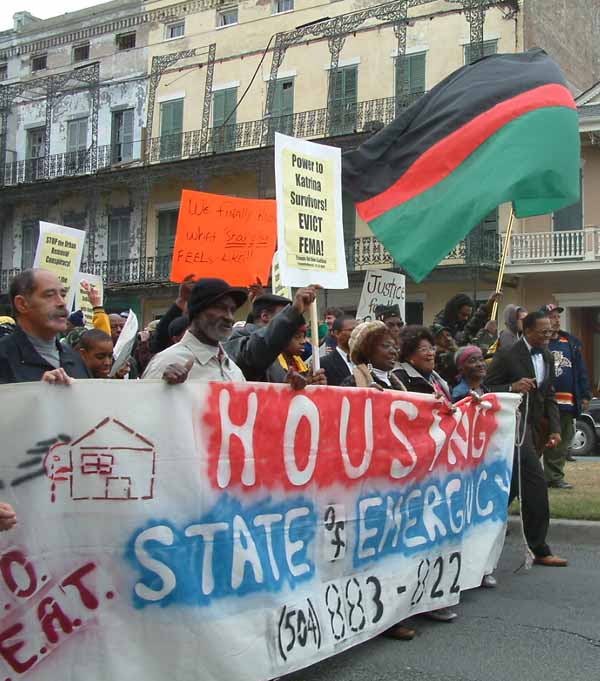
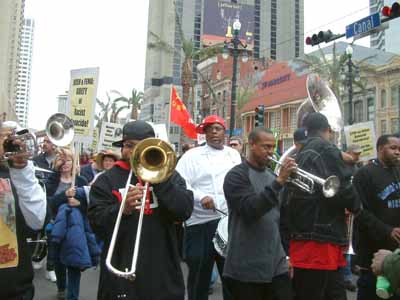
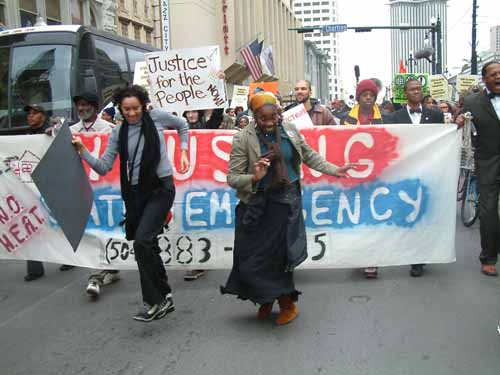
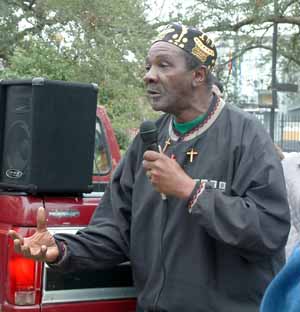
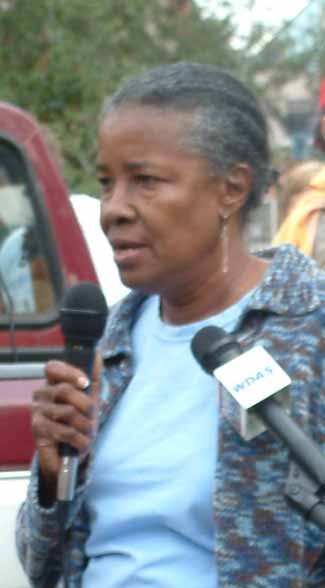
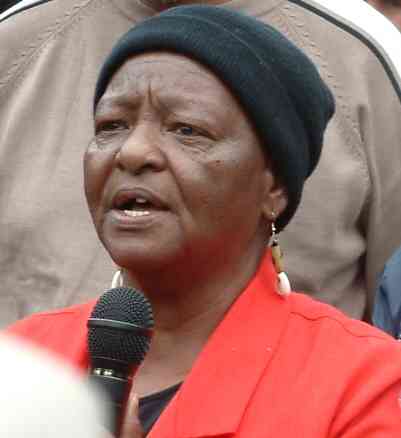
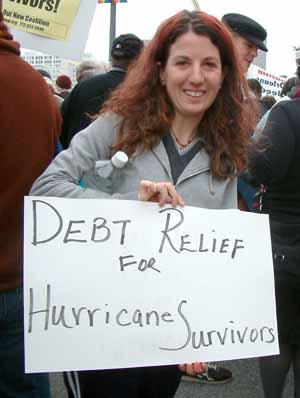
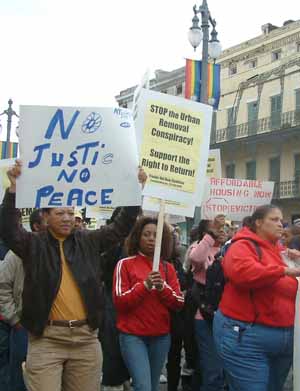
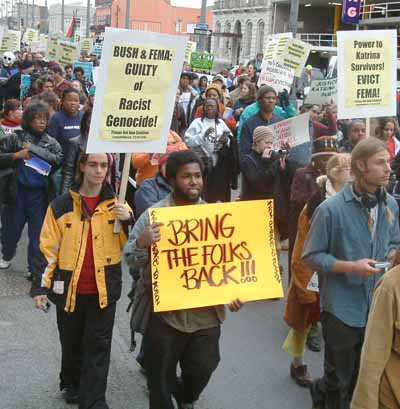
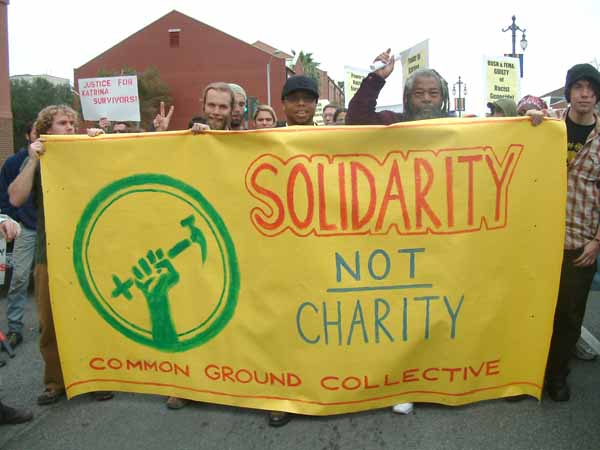

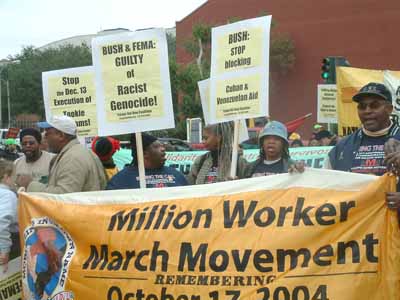
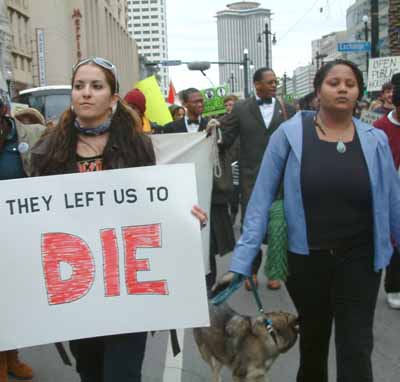
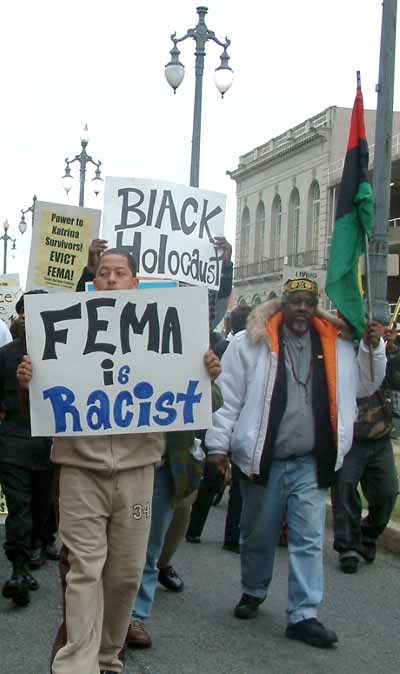
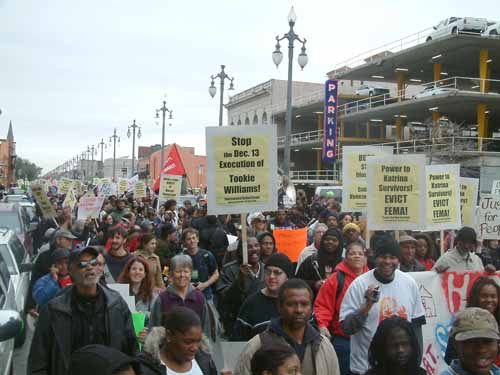
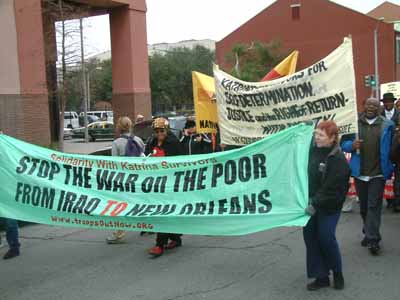
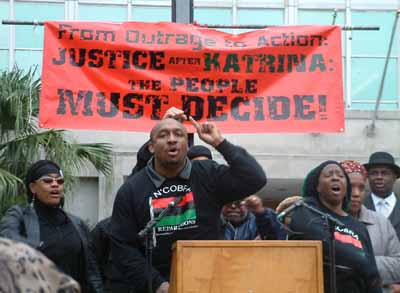
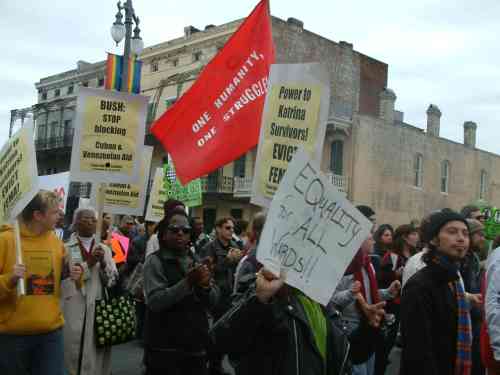
[TOP]
From Outrage to Action
State of Emergency Conference and
Survivors
General Assembly, Jackson, Mississippi
December 8-9, 2005
March on New Orleans, December
10, 2005
Demand the Right to Return
Background and Purpose
On August 29, 2005 Katrina struck New Orleans and the Gulf Coast with the full force of a category 5 hurricane. Within hours flood waters would rush the City of New Orleans pouring out of an outdated levee system that, due to years of gross and blatant government neglect, was not prepared to withstand Katrina’s powerful winds. Quickly these waters would find and swallow up the city’s blackest and poorest communities. Indeed many reported hearing explosions before seeing the advancing waters. This has left some to conclude that the floods invaded some black communities and missed some white ones not by chance but by design.
For many there was a memory of 1927 when white business owners busted the levee in black areas in order to guide the water away from their businesses and affluent communities. This history supported the belief that Katrina flood waters found their way to the jet black ninth ward and East New Orleans by design.
Within days after Katrina struck, dead bodies, mostly black bodies, floated through the streets, as ambulances and helicopters rushed passed black and poor victims toward white and affluent communities, leaving the economically less advantaged and the black to fend for themselves.
The situation would produce countless acts of heroism and courage as men, women and children would reach out to each other and save the lives of family, friends and strangers as government agencies and the Red Cross either rushed to the aid of the affluent and the white or dilly dallied as the devastation and disaster mushroomed. The survivors would seek refuge in the New Orleans Super Dome and at the Civic Center as they would gather and then wait for buses which took three, four and often five and six days to come. The people waited in dangerous and unhealthy conditions without clean clothing, water, electricity, toiletries, and often without food.
The major media would turn away, ignore or fail to show the people’s acts of courage and heroism and become preoccupied with what they termed acts of thugs. Although there were few if any gun shot casualties reported to any law enforcement or medical personnel, the media repeatedly ran stories on phantom shootings at police and medical aids by so called armed thugs, while broadcasting over and over again the same picture of the same few people carrying gym shoes, clothing, food, and in one case a T.V. from a few stores. To the major media blacks seeking and finding food from abandoned stores were looters, while whites doing the same were identified as having found food.
The Governor of Louisiana would call on State and local law enforcement to shoot to kill the so-called looters. The numbers of those gunned down by police and National Guards are suspected to be at least thirty (30). In Mississippi and New Orleans many were herded into jail with high bonds for petty larceny or on other exaggerated charges.
When the buses finally arrived, blacks and much of the poor were taken to so called shelters and placed in concentration camp like conditions at gun point. Whites and the more affluent were transported to white churches and other facilities and shelters. Across the country outrage has grown and still grows as the criminal indifference and mistreatment by the U. S. Government, FEMA, the Red Cross, State Governments, Local Governments and others towards the survivors and victims of hurricane Katrina became and still becomes more and more apparent.
The outrageousness of the behavior of these Governments and agencies becomes even more obvious, as Katrina survivors were left with little money, without homes, jobs and dignity and some without their children who could not be found and nowhere have the American governments given adequate help or shown genuine concern. Survivors seeking help have been shuffled from the Red Cross, to FEMA, to insurance companies and back to the Red Cross again and have received little relief. Full recovery is nowhere in sight.
The insurance companies refuse to pay for homes lost, FEMA pays too little, too slow. Large numbers of Red Cross workers are racist, often dishonest, and unreliable at best. The U.S. Government, the State and Local governments involved and big time money changers go forward on plans to rebuild New Orleans without most of its displaced black and poor populations. Meanwhile hundreds of Katrina survivors linger in jail charged with a variety of illegitimate charges, and well over 1,000 families of Katrina and the government’s brutal neglect have buried their dead and no compensation for wrongful death has been offered or seriously considered.
The burden of suffering and financial loss will once again be slung on the back of the poor and a nation of black people which already finds millions of its people in poverty, prison and jails, many being held as political prisoners. This cross is to be carried by a nation of people already owed reparation for centuries of slave trade, slavery, Jim Crow, lynching, discrimination and countless other acts of lawlessness.
Remembering the horrors of Katrina and the history of racial and class oppression is not enough. The time has come to turn outrage to action.
On December 8, 2005 through December 10, 2005 scores of survivors and their supporters (people who believe in freedom and justice) will gather in Jackson, Mississippi and New Orleans. We will gather for the National State of Emergency Conference in Jackson on the 8th and 9th of December. Supporters and -representatives and leaders from over 50 black organizations, and labor unions and their third world and anti-racists allies will meet in support and solidarity of the survivors and initiate an action plan to rescue the black population and all oppressed populations from their dependency on racist and incompetent governments. Most importantly, the Katrina Survivors will gather at the same place and time to form a General Assembly to speak for themselves and to exercise their rights to self determination.
Survivors have raised the demands for immediate jobs, education, housing, clothing and food. Survivors have made the demand to place the control and direction of Gulf Coast reconstruction in their hands. Survivors demand the opportunity to exercise the right to return to the Gulf Coast with dignity and without poverty. Survivors have demanded a complete investigation into and prosecution of all government agencies for crimes against humanity and human rights violations.
Objectives
The Objectives of the December 8-10, 2005 Assembly/Conference and the Demonstration are as follows:
1. To build a Hurricane Katrina Survivors General Assembly which will speak for the Gulf Coast Survivors and which will demand and exercise the peoples right to self determination in New Orleans and other effected gulf coast areas in Louisiana, Mississippi and Alabama.
2. To demand the people’s right to return to New Orleans and to the Mississippi and Alabama Gulf Coast with dignity and without poverty.
3. To demand reparations for the governments’ criminal indifference, negligence, and malicious actions toward the victims and survivors, before, during and after Katrina.
4. To demand, launch and/or continue investigations, law suits and prosecutions of governments, agencies and persons -responsible for the human rights violations and crimes against humanity committed before, during and after Katrina.
5. To build a national united front in support and solidarity with the self determination and reparation demands of Katrina Survivors, and through this front to design and initiate a plan of action and institutions which will allow black people to fortify themselves and serve their own needs in the face of future disasters which are either natural or by human hands.
6. To link today’s demands for reparations and self determination to the historical and future struggle of black people and other oppressed populations for self determination and reparations.
Location of Events
On December 8, 2005, 7pm-11pm the youth will speak out on Katrina at the Business School of Jackson State University at 1300 Lynch Street, Jackson, MS , room 134.
On December 9, 2005 from 9am-6pm in the “State of Emergency Conference” the survivors will tell their stories and conference participants will organize for action in support of Katrina Survivors’ demands and to build a front which will confront and combat the racist and abusive human rights violations of the American Government and its friends.
The General Assembly and the Conference will take place at Anderson United Methodist Church, located in Jackson, MS at 6205 Hanging Moss Road, off I-220.
On Friday evening December 9, 2005 from 8pm-11pm there will be a cultural program and rally at a location to be announced in Jackson, MS.
On Saturday, December 10, 2005 which is International Human Rights Day. The survivors and their supporters (all of us) will march on New Orleans in support of all the survivors’ demands and in particular in support of the right of the survivors to return to the Gulf Coast.
For further information call 1-888-310-PHRF(7473), or call 601-353-5566, or email outrage2action@yahoo.com
[TOP]
Thanksgiving Relief Effort a Success!
December Holiday Roadtrip for Relief
Common Ground reports that their Roadtrip for Relief -organized over the Thanksgiving week was a success. As one of the organizers reports, “During our first convergence of volunteers, we cleaned out over 30 homes, the streets around our distribution center, a community center and a women’s center. Thanks to the work of all of you, we now have power in all of our 9th Ward locations, an open media center and internet lab, and a 22 minute documentary.” Organizers expressed their enthusiasm for all those who joined in donating supplies, hard labor, and creative energy and for contending with the difficulties involved in building up the independent resources of the people.
Common Ground is now calling on all those interested to participate in a winter Roadtrip for Relief. They will offer food and basic shelter to all volunteers able to arrange transportation and to work within one of the many programs in and around New Orleans.
They report that huge areas of New Orleans remain without power, and mountains of trash and debris continue to litter the city. Police and military vehicles remain on constant patrol, and a curfew remains in place, poised for selective enforcement.
Common Ground’s work now includes legal teams, food, water and cleaning supply distribution, free medical aid, a community newspaper, anti-eviction work, a women’s center, free internet labs, a community radio station, clean up crews, construction crews, environmental restoration and roof repair teams. They urge everyone who can to join in these efforts!
For information about volunteering during the Holiday Roadtrip for Relief, please email commongroundvolunteers@gmail.com or call our volunteer information line at (504) 218-6613.
[TOP]
New Waveland Cafe Katrina Relief Kitchen Moving
The Rainbow started Relief Kitchen in Waveland MS is shutting down and reforming in Saint Bernard’s Parrish. We are still in need of volunteers...Please Help.
The New Waveland Café in Waveland MS, initiated by a group of Rainbows, was the first recognized relief kitchen in Hancock County after Hurricane Katrina. The Kitchen has become a community center for locals and volunteers in Waveland and the surrounding areas. People are drawn to this kitchen because the food is healthy, much of it is organic, and it is always cooked with style. The kitchen is run completely by volunteers who focus on empowering this community to continue helping one another even after the kitchen is gone. Anyone who expresses interest is welcome to facilitate a meal. When people stroll up in the pre-coffee dawn of 5:30 a.m. looking groggy, they are pointed in the direction of the coffee pot and invited to get the ball rolling. Local children have meandered by asking questions about the kitchen. Now we have 9 and 10 year-olds chopping vegetables for dinner, and spooning out soup in the serving line. Most nights during the week different local bands come to play on the stage at dinnertime. Often, when dinner is finished, tables are pushed back and a spontaneous community dance party ensues. Afterwards, locals and volunteers work together to clean the dining room.
The New Waveland Café is closing down on the Saturday after Thanksgiving. It is re-opening at a new location in St. Bernard’s Parrish, just outside of New Orleans. The folks who are continuing on with this mission are in need of a larger volunteer force and many resources in order to carry out this project. Many of the people moving to St. Bernard’s Parrish have been working for 1 to 2 months, seven days a week, with very few breaks. This move is going to take a lot of work, and some brand-spanking new creative vibrance will be -enthusiastically welcome…
If you would like to participate you will find info on volunteering at: www.emergencycommunities.org
or email: volunteer@emergencycommunities.org
[TOP]
9th Ward/Downtown Project Update
The 9th Ward/Downtown project was started less than two months ago by talking with residents and posting flyers on every door in the upper 9th Ward. From the connections we made with the community, the project has grown immensely...along with the needs.
The locations we are currently working out of are the Distribution center at 1507 Louisa Street, the Women’s center at 1500 Louisa Street, and the Community center at 1610 Pauline Street.
One of the first phone calls we received was from a resident with a flood damaged daycare center. Her idea was for Common Ground to fix the place up in exchange for rent. At the end of the agreed period, the space would reopen as a daycare. We decided to use her idea as the model for acquiring the space we would need on the project. The Common Ground Collective agreed to repair the damaged daycare over a three month period and to use the building to help the community.
We used this space to open the first distribution center in the 9th Ward in an effort to provide a beacon of hope amid the darkened and militarized streets and to address the needs of residents who were returning to an area with no services available. The center is open seven days a week offering goods, safety/protective gear, a free medical clinic, a housing advocacy/legal office, a tool lending library, a kitchen to prepare hot meals, a solar shower, and is often used as an alternative to the Orleans Parish Prison when law-enforcement or the National Guard pick homeless residents up for walking after dark in curfew hours. In addition to these services, the center has work crews that are dispatched daily to address the community’s needs.
The items distributed at the center include water, food, clothing, diapers, toiletries, school supplies, contractor-grade trash sacks, cleaning agents, cleaning equipment, and protective gear such as Tyvek suits, gloves, masks, goggles, and rubber boots. We are usually well-stocked, however, the needs are growing daily and our suppliers’ ability to donate is not.
The CommonGround tool lending library consists of several hundred brooms, mops, shovels, and rakes, along with several dozen respirators and bleach sprayers. Generators, power tools, and hand trucks are available at times, but not often.
The Hot Meal program offers hot meals to the community and to CommonGround volunteers. This service is important because gas service is unavailable to most of New Orleans and electric service is as well. However, due to a difficulty in staffing the project, the service is currently inconsistent. We are doing what we can to remedy the issue and are requesting additional help from anyone who enjoys feeding people. We are currently trying to work out the details with a local restaurant so that we can work together to feed everyone in the community. We are also attempting to initiate the Feed New Orleans project which will facilitate a cooperative relationship between all community kitchens in the greater New Orleans area.
The Common Ground free clinic #2 is staffed by a registered nurse. On Fridays, a medical doctor spends the day at the center along with acupuncturists and message therapists. Basic first-aid and medical care is provided on other days. The clinic offers the only accessible medical services to the 9th Ward. The Common Ground clinic #1 in Algiers sends a mobile clinic to the lower 9th on Mondays and Thursdays.
The Housing Advocacy office also serves as a legal clinic on Saturdays. Attorneys come and review the information that Common Ground volunteers gathered over the week from community members regarding issues from arrests to illegal evictions. Community members are encouraged to come and discuss the issues with volunteers and the attorneys. The housing advocacy is using the courts as well as direct action tactics to stop illegal evictions with great success. Common Ground housing advocacy is working to ensure the right of return for residents of public housing as well.
Common Ground work crews go out daily to tarp roofs, clean homes, remove furniture and refrigerators, clean streets of debris and rotten waste, and do mold remediation. We also attempt to do social work teams that go out to listen to residents, fill prescriptions, provide transportation to appointments, and whatever else we can assist with. More volunteers are needed in this area in order for this program to occur daily.
The Common Ground Women’s center provides the only dedicated safe space for women in the city. It has in-depth information about various recourses available to women. Books and clothing are also available. This space is open for returning women and present residents. It is also available to female volunteers who may be uncomfortable with mixed gender sleeping arrangements. The center is very basic. Sheets are draped over gutted walls and it has no electrical service.
The Common Ground Community Center is being forged from a flood damaged church building. This space was acquired when a local pastor called us from the flyer on his door. The Common Ground Collective was given use of the building for one year. We agreed to use the same model and repair the structure. Initially, the building will provide housing for volunteers as well as take over as a dispatch for our work crews.
Once the repairs are completed, an arts and entrepreneurship program will be developed and housed there. The program will teach young men and women how to use video, edit the footage, and will provide a computer lab where the training and editing can be performed. We are currently working to organize a dark room and other visual arts programs. The curriculum will educate youth on the history of oppression and social justice movements with a great emphasis placed on the importance of documenting injustices. In addition, a literacy program along with a GED preparation program will be housed there. The church elders will participate in the formation of the programs and will take over the entire operation after one year.
We are working with community members on the formation of a community council where residents will help to guide our efforts in their communities and have their views heard. The first official meeting will be on Sunday, December 4th 2005.
The Common Ground Collective is working to aid residents in organizing programs such as an information booth for the lower 9th Ward and a shelter for returning families. The residents working on the info booth want help with funding, copies, and volunteers for grief counseling. The residents organizing the shelter have a large space and want to open it for returning residents. We have offered to help prepare the space and share supplies with their effort.
Future plans of the 9th Ward/Downtown project include a free school, a childcare co-op, an established community evacuation plan, bio-remediation, shelter and family stay programs to find places for people to stay while they repair their homes, and an increase in community organizing in order to establish an effective resistance to the city’s attempts to gentrify and bull-doze large swaths of New Orleans’ historically Black neighborhoods.
Electrical service is unavailable to most of the 9th Ward/Downtown project area. Gas service is unavailable as well. There are no clinics, stores or other places to get needed goods except for our distribution center. Trash and debris cover large swaths of the city except for predominately white upper-class neighborhoods.
The city is doing everything possible to discourage residents from returning. Those that do return are met with the harsh reality that the city that left them to die is restricting their ability to live with basic services and dignity. Along with the restricting of services and schools, the city and its developers are trying to use Eminent Domain to strip the homes from families who have lived there for generations. This neo-Manifest Destiny can only be challenged if residents return soon.
Help is needed here.
[TOP]
Government Again Forcing 54,000 Families Out
Struggles to Stop Evictions Go Forward
The federal government announced November 14 that it will stop paying for housing for many of the families displaced by Katrina and the government-organized disaster that followed. The government first refused to evacuate residents, then forced hundreds of thousands of families to leave and scattered them across the country. Families were forcibly torn apart and then housed in camps, trailers, and hotel rooms.
About 5,700 hotels in all fifty states are currently housing Katrina families. The government is paying about $3 million a day for almost 50,000 rooms. Now, the government, in the name of “helping” survivors “get back on their feet,” is going to stop paying for the hotel rooms, and potentially all the temporary housing. It is demanding that the 54,000 families in hotel rooms be moved into rental apartments.
The government initially set a deadline of December 1. After concerted organizing by housing and community groups as well as outrage expressed by families and local and state officials, the deadline for most was extended to January 7. Even so, the main result for many families will be eviction, again.
Families in Texas, many around Houston, occupy an estimated 19,730 hotel rooms and another 8,900 rooms are filled with survivors in Georgia. About 12,000 rooms house families in Louisiana and Mississippi. The January deadline means moving more than 100,000 people in a few weeks. Local officials are already scrambling to try and provide for families and demanding that the government provide more time and money to meet people’s needs.
In addition, the government is guaranteeing only three months in additional rental payments, capped at $777 a month for a two-bedroom apartment (hotel operators received an average $2,100 a month). Few landlords are willing to accept three-month leases, especially in the areas around New Orleans where rents have skyrocketed in the wake of Katrina.
Numerous anti-eviction battles are already being waged in the New Orleans area to block these and other evictions. Residents from public housing projects damaged by the storm are demanding their right to remain or to return without rent increases. As one statement by housing activists put it, “Our association knows full well that the [government] agencies in charge of these housing complexes are using allegations of storm damage to the complexes as a pretext for expelling working class African Americans, in a very blatant attempt to co-opt our homes and sell them to developers to build high-priced housing. In this way, they are taking HUD Secretary Alfonso Jackson’s statement that this disaster will result in a ‘whiter New Orleans’ and turning it into a reality. We say no to this ethnic cleansing.”
Community housing rights meetings are taking place and a housing rights march was organized on December 3 rd. As one of the reports brought out “Landlords are raising rents and throwing resident families and their property out on the street. Meanwhile, HANO (Housing Authority of New Orleans) is locking up perfectly livable public housing while their residents are stranded in shelters around the country. If the government can feed and shelter 120,000 troops in Iraq, they can do the same for New Orleans as we return and rebuild. Together we can stop evictions and fight for affordable housing, in the courts and in the streets!
Anti-eviction teams have been organized to directly intervene to stop evictions in progress. They have also been successful in defending people’s right to return to their homes and remain there, blocking government efforts to drive them out.
On November 22, a lawsuit filed on behalf of ACORN, People’s Hurricane Relief Fund, UNITE HERE!, SEIU and New Orleans renters won an immediate stay in evictions, that they be contacted about evictions and have at least 45 days to respond. Tenants were being evicted based on notices “tacked” to their apartment doors, even though landlords knew they had been dispersed to government camps across the country. For the first time, organizers succeeded in requiring the Federal Emergency Management Agency (FEMA) to provide information as to where people had been displaced.
Forest Park housing residents also fought and achieved some initial concessions from the management of their Algiers, New Orleans complex. Residents were given more time to vacate the apartments for renovations and written guarantees that they can return without rent increases.
People are now also contending with where to find temporary housing during the renovations in a situation where large amounts of low-income housing were wiped out by the storm. It is estimated that of 150,000 low-income housing units destroyed, only about 50,000 will be rebuilt. More than 1.5 million families were displaced by the government-organized Katrina disaster, with more than 320,000 forced into shelters of various kinds and scattered nationwide.
Survivors, together with local people and activists nationwide are strengthening their organizing work under the banners -Housing is a Right! and the Right to Return and Rebuild!
[TOP]
Nightmare for Family Members and Prisoners
NEW ORLEANS, LA – “They won’t let my daughter out of prison, even though she was supposed to have been released weeks ago,” says Althea Francois. “This is a long time for us to be separated – I’m worried sick about her. And I know there are thousands of families in the same situation.”
Stories like Ms. Francois’ have galvanized a broad coalition of human rights organizations, community groups, Orleans Parish prisoners, and their families, who will gathered on Wednesday in front of the now infamous Orleans Parish Prison (OPP) to tell their stories. The gathering took place during The Critical Resistance Delegation on Safety and the Status of Prisoners, which is calling attention to charges that prisoners were left to drown in locked jail cells, hundreds more were arrested for the ‘crime’ of trying to feed themselves after Katrina, and thousands have had their cases thrown into legal limbo post-Katrina.
Participants demanded an independent investigation into the evacuation of OPP and amnesty for those arrested for trying to feed and clothe themselves post-Katrina, while calling for real public safety in a rebuilt New Orleans. “Rising from the devastation of Katrina, we have an amazing opportunity to rebuild a truly new and genuine system of public safety for New Orleans,” said Xochitl Bervera, Co-Director of Families and Friends of Louisiana’s Incarcerated Children.
Pointing to additional recent accounts of police beatings, “Katrina’s aftermath reflects the way we as a nation increasingly deal with social ills: police and imprison primarily poor Black communities for ‘crimes’ that are reflections of poverty and desperation,” said Tamika Middleton, New Orleans-based Organizer with Critical Resistance, a national grassroots organization whose mission is to end society’s use of imprisonment as an answer to social problems.
Louisiana has had the highest rate of incarceration of any state in the U.S. Blacks are grossly over-represented, making up 72% of the state prison population, while only representing 35% of the total population “This emphasis on ‘law and order’ has historically had a devastating impact on the people of New Orleans,” Middleton continued. “Locking people up in this crisis is cruel mismanagement of city resources and counters the outpouring of the world’s support and concern for all survivors of Hurricane Katrina.”
Critical Resistance South has prepared the following Katrina Fact Sheet.
What Happened to Prisoners in Flooded Louisiana Prisons
* Around 8,500 Louisiana prisoners were moved from flooded prisons and jails to 35 different Louisiana prisons and jails. A list of those prisons and jails can be found at: http://www.lidab.com/doc_lists.htm
* Federal prisoners were moved to a Federal prison in Florida. We are working on obtaining more information. There is still not a full accounting of what happened in the evacuation of Old Parish Prison in New Orleans (OPP), although troubling reports have been received. According to a September 22nd Human Rights Watch report, 517 prisoners who were being held at OPP remain unaccounted for. Prisoners who had been housed in Templeman III, a building in the OPP complex, told HRW workers that they were left without food or water in rising flood conditions, with water as high as their necks. While some were able to save themselves, they said other prisoners below them, left locked in their cells, were crying and asking for help.
* Another, earlier story explained that guards moved people up floors & then into a gym, leaving them for two days without food and water. Most were able to break windows and escape rising water, swimming out of the jail. There are reports, thus far unconfirmed, that people who were locked in holding cells were left to drown. According to these reports, those who escaped from the flooding prison turned themselves in and were eventually transferred.
* Reports about prisoners who were evacuated indicate that they were held at gunpoint on New Orleans overpasses awaiting transport for hours, even days.
* In some areas affected by the storm, prisoners are being used as a labor force, providing relief services and clearing debris.
* Prisoners reported being refused the right to call home to check on loved ones.
How To Find and Contact Prisoners Moved after Katrina
* Local and state prisoners who were evacuated can be located by name on a list being assembled by a coalition of attorney’s groups in Louisiana. Attorneys are currently attempting to contact and interview every adult prisoner moved in the wake of Katrina, so this list will be updated. That list can be found at: www.lidab. com/doc_lists.htm and updates and further links can be found at: www.lacdlkatrinarelief.blogspot.com/
* The Department of Corrections (DOC) established hotlines to call for locating family members moved from Orleans’ area prisons and jails. They are: 225-342-3998 and 225-342-5935 and are supposed to be staffed from 7:00 a.m. – 10:00 p.m. Hunt Correctional Center, where many male prisoners from OPP may have been transferred, also set up a hotline: 225-352-5924. DOC staff will only tell family members where their loved one is located, and no other information (release date, case status, etc.). Family members should be allowed to give a message to their loved one.
* Youth who were in Bridge City Center for Youth (BCCY) were moved to Jetson Correctional Center and can be located by calling Jetson at 225-778-9000; ask for John Anderson, Michael Gaines, Ricky Wright, or Linda London. Demand the child be brought to the phone to speak immediately with their family member.
* Young people held at the Youth Study Center, Plaquemine Detention Center, St. Bernard Center, Terrebonne Detention Center, and Riverde Detention Center have been routed to placements in other parts of the state. Family members should call Perla at (225) 287-7988 or (225) 328-3607 (cell) or Stacey at (225)287-7955 to find out where their child is located. Ask Perla for a phone number, call, and demand that they be permitted to speak to their child immediately on the phone. [...]
Criminal Background Checks for Survivors Headed to Shelters
* Some American Red Cross shelters accepting evacuees from the areas affected by Katrina are refusing entry without a criminal background check. This has been confirmed in at least three states, and according to one Red Cross spokesperson, the practice is “supported” by the organization.
* The FBI opened its criminal database to a wider number of people, providing access to that information through local police and sheriffs departments. Some local departments are processing criminal background checks of Katrina survivors, people volunteering to do relief work, and people volunteering housing free of charge to requestors and, based on that record, judging if the person is “suitable” or “unsuitable” as a volunteer, host, or new resident or guest.
* According to National Public Radio and other sources, many of the offers of housing require that the survivor have no criminal record or record of eviction.
The Use of Prisons and Police Post Katrina
* A makeshift jail has been established in the New Orleans Greyhound station. Angola Prison Warden Burl Cain, brought in to run the jail, has declared that the construction of this makeshift jail is a “real start” to rebuilding NewOrleans.
* An unknown number of people have arrested for offenses related to feeding and clothing themselves post Katrina.
This fact sheet was compiled by Critical Resistance, a national grassroots organization seeking to end the use of imprisonment as an answer to social, political and economic problems. Critical Resistance’s Southern Regional Office, located in New Orleans’ mid-city neighborhood, was destroyed by Hurricane Katrina.
Critical Resistance is working with Families and Friends of Louisiana’s Incarcerated Children and Communities United to assist prisoners and their loved ones attempting to reunite after Katrina. For more information or to support this and other work, please call CR at 510-444-0484 or email national@criticalresistance.org.
[TOP]
Families and Friends of Louisiana’s Incarcerated Children is a grassroots organization with a long history of fighting for New Orleans’ most vulnerable. Since hurricane Katrina, they have been on the front lines of relief, spending time in the shelters, helping advocate for the refugees of New Orleans, and trying to find out what happened to both adults and children who were locked up while New Orleans flooded.
There has been a lot of media hysteria regarding those who were locked in New Orleans’ prisons during the hurricane, stories that make it sound like a Hollywood action film where murderers use a disaster to escape and wreck havoc.
This is exactly wrong. The truth is that tales from the imprisoned population of New Orleans are among the most heartbreaking stories of the past week. Families are still looking for loved ones lost in the system. According to organizers with FFLIC, of approximately 240 kids in state custody, as of a couple of days ago only 6 or 7 parents had been able to track down their children.
According to statistics compiled by the Juvenile Justice -Project of Louisiana, at least 78% of New Orleans’ incarcerated youth were locked up for nonviolent offenses. The detention center in Jefferson Parish reports that 96% of the youth held there in 2000 were for nonviolent offenses. At least a third of youth in prison have been sentenced to three or more years for nonviolent offenses. In New Orleans, 95% of the detained youth in 1999 were African-American. Louisiana taxpayers spend $96,713 to incarcerate a single child, and $4,724 to educate a child in the public schools.
According to a report by Human Rights Watch, “the state of Louisiana has one of the highest rates in the country of children living in poverty and children not in school or working. Large numbers of children, especially black children, are suspended from school each year, sometimes for the whole year. Approximately 1,500 Louisiana children are confined in secure correctional facilities each year...In response to the question, ‘what would you most like to change here?’, virtually every child at all of the facilities responded that they would like the guards to stop hitting them and that they would like more food. Children consistently told us that they were hungry.”
From an article by Jordan Flaherty
[TOP]